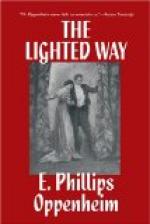“Count Sabatini was very kind to her,” Arnold remarked. “Poor little girl, I am afraid she is going to have rather a rough time. She had quite an alarming experience last night after our return.”
“You must tell me all about it presently,” Fenella declared. “Shall we take this little round table near the window? It will be delightful, that, for when we are tired with one another we can watch the people in the street. Have you ever sat and watched the people in the street, Arnold?”
“Not often,” he answered, giving his hat to a waiter and following her across the little room. “You see, there are not many people to watch from the windows of where I live, but there is always the river.”
“A terribly dreary place,” Fenella declared.
Arnold shook his head.
“Don’t believe it,” he replied. “Only a short time ago, the days were very dark indeed. Ruth and I together did little else except watch the barges come up, and the slowly moving vessels, and the lights, and the swarms of people on Blackfriars Bridge. Life was all watching then.”
“One would weary soon,” she murmured, “of being a spectator. You are scarcely that now.”
“There has been a great change,” he answered simply. “In those days I was very near starvation. I had no idea how I was going to find work. Yet even then I found myself longing for adventures of any sort,—anything to quicken the blood, to feel the earth swell beneath my feet.”
She was watching him with that curious look in her eyes which he never wholly understood—half mocking, half tender.
“And after all,” she murmured, “you found your way to Tooley Street and the office of Mr. Samuel Weatherley.”
She threw herself back in her chair and laughed so irresistibly that Arnold, in a moment or two, found himself sharing her merriment.
“It is all very well,” he said presently, “but I am not at all sure that adventures do not sometimes come even to Tooley Street.”
She shook her head.
“I shall never believe it. Tell me now about Mr. Weatherley? Was he very sorry when he arrived for having caused you so much anxiety?”
“I have not yet seen Mr. Weatherley,” Arnold replied. “Up till the time when I left the office, he had not arrived.”
She set down the glass which she had been in the act of raising to her lips. For the first time she seemed to take this matter seriously.
“What time was that?” she asked.
“Ten minutes past twelve.”
She frowned.
“It certainly does begin to look a little queer,” she admitted. “Do you think that he has met with an accident?”
“We have already tried the hospitals and the police station,” he told her.
She looked at him steadfastly.
“You have an idea—you have some idea of what has happened,” she said.
“Nothing definite,” Arnold replied, gravely. “I cannot imagine what it all means, but I believe that Mr. Weatherley has disappeared.”




